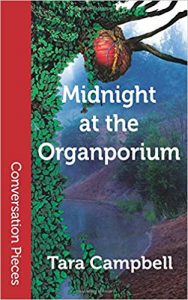Ian Mond Reviews Midnight at the Organporium by Tara Campbell
 Midnight at the Organporium, Tara Campbell (Aqueduct Press 978-1-61976-163-6, $12.00, 112pp, tp) March 2019.
Midnight at the Organporium, Tara Campbell (Aqueduct Press 978-1-61976-163-6, $12.00, 112pp, tp) March 2019.
Tara Campbell’s Midnight at the Organporium (Conversation Pieces: Volume 67) is a more eclectic collection, showcasing an array of moods and story-telling techniques. In the opening piece, “Death Sure Changes a Person”, Harlan is visited by his dead wife, Lucille, who orders him to start dating again. This surprises Harlan, not because the advice is coming from a ghost but because “here was the world’s most jealous woman telling me I should run out and start dating someone new.” The ending is a tad predictable, but it’s offset by the humour and warmth generated by Harlan’s matter-of-fact, take-things-as-they-come attitude. “New Growth” with its homicidal philodendron, Eugene, has all the ingredients for an over-the-top comedy, but the melodrama and grotesqueries are downplayed for a painful piece about domestic abuse where our protagonist Molly has gone back to her ex-boyfriend Joe because he’s promised not to punch her again. The story follows a familiar and distressing arc that we’ve seen played out far too regularly on the news. It’s Eugene – with vines spread across the living room wall – who sees what Molly refuses to accept and is prepared to protect its owner. In the extraordinary “Aftermilk”, a mother’s advice to her children about when best to butter their toast – “you’ve got to get to the toaster as soon as it pops, kids” – becomes this sustained, gut-wrenching soliloquy about questionable life-choices and lost opportunities.
The shorter pieces also show off Campbell’s range. Told in the second person, “You Commuter” gets to the anxieties of being stared at on public transport, especially if you’re a woman. “Another Damn Cottage” and “Bedpea” are distilled retellings of Red Riding Hood and the Princess and the Pea. The latter is a particularly harrowing account: the Queen from the fairy tale is put to death as a Witch; her test, to verify the claim of a young girl recently arrived to the Kingdom that she is a Princess – “a pea under twenty mattresses and twenty eiderdown beds” – viewed as the work of the Devil. “The Rapture” cleverly, and with a sardonic disposition, re-contextualises white flight as a religious end-time event, because “how else do you explain all the white people leaving town? It’s the Rapture, and it’s taking the white people first because all those posters with a blue-eyed, straight haired Jesus were actually true.”
By far my favourite story, the one that I think best highlights the breadth of Campbell’s imagination and her askew view of the world, is “Speculum Crede”. It begins with a cracking opening paragraph:
Marie hadn’t been looking forward to the company picnic that year, even before her daughter began to turn green. But until her little Lisa shrank and sprouted a stem and turned into a hopping green bean, it had all merely been an annoyance….
Marie’s daughter isn’t the only one to change at the aforementioned picnic: everyone around her, including Marie, mutate (her husband becomes a white bear, she transforms into a whale). As no-one seems to be reacting to the metamorphosis, Marie assumes she’s going crazy, but when we switch point of view to the CEO of the company and then the director of HR, we realise that everyone is going through a change, but experiencing it differently. Marie might believe she’s a whale, but in the eyes of her CEO she’s changed into “a fat pink Peep bird.” While the theme is instantly apparent – our realities and our identity are defined by how we view ourselves and how we view others – it’s the way Campbell commits to the idea, how each person embodies their change, reluctantly and willingly, that makes this such a terrific story.
If I have a complaint it’s not about either collection, but the fact that while you can subscribe to the Conversation Pieces, the subscription is limited to the United States because of postage. If I might, I would humbly suggest an ebook subscription, because I would sign up immediately.
Ian Mond loves to talk about books. For eight years he co-hosted a book podcast, The Writer and the Critic, with Kirstyn McDermott. Recently he has revived his blog, The Hysterical Hamster, and is again posting mostly vulgar reviews on an eclectic range of literary and genre novels. You can also follow Ian on Twitter (@Mondyboy) or contact him at mondyboy74@gmail.com.
This review and more like it in the August 2019 issue of Locus.
 While you are here, please take a moment to support Locus with a one-time or recurring donation. We rely on reader donations to keep the magazine and site going, and would like to keep the site paywall free, but WE NEED YOUR FINANCIAL SUPPORT to continue quality coverage of the science fiction and fantasy field.
While you are here, please take a moment to support Locus with a one-time or recurring donation. We rely on reader donations to keep the magazine and site going, and would like to keep the site paywall free, but WE NEED YOUR FINANCIAL SUPPORT to continue quality coverage of the science fiction and fantasy field.





